best Bee Gees songs (A-Z) ↓↓↓
Scroll down and discover the best Bee Gees songs (A-Z)!
We've meticulously organized our extensive library for your convenience. Explore best Bee Gees songs sorted by popularity to easily find the tracks that resonate most with listeners, or browse through our alphabetical (A-Z) listing to discover hidden gems and classic favorites alike. Whether you’re a long-time fan or new to Bee Gees music, there’s something for everyone to enjoy.
♫Bee Gees
Best Bee Gees songs
- 1 Stayin’ Alive
- 2 Words
- 3 How Deep Is Your Love
- 4 Massachusetts
- 5 Night Fever
- 6 Grease
- 7 To Love Somebody
- 8 How Can You Mend A Broken Heart?
- 9 More Than A Woman
- 10 I Started A Joke
- 11 Alive
- 12 I Close My Eyes
- 13 Alone
- 14 Holiday
- 15 Don’t Forget To Remember
- 16 Lonely Days
- 17 Tragedy
- 18 Run To Me
- 19 My World
- 20 Nights On Broadway
- 21 Heartbreaker
- 22 Islands In The Stream
- 23 First Of May
- 24 Angela
- 25 Emotion
- 26 Alone Again
- 27 Saved By The Bell
- 28 I’ve Gotta Get A Message To You
- 29 If I Can’t Have You
- 30 Guilty
A-Z songs of Bee Gees (267)
- ♫ 2 Years On
- ♫ Above And Beyond
- ♫ Alive
- ♫ All This Making Love
- ♫ Alone
- ♫ Alone Again
- ♫ And The Sun Will Shine
- ♫ Angela
- ♫ Anything For You
- ♫ August October
- ♫ Baby As You Turn Away
- ♫ Back Home
- ♫ Backtafunk
- ♫ Bad Bad Dreams
- ♫ Be Who You Are
- ♫ Big Chance
- ♫ Birdie Told Me
- ♫ Black Diamond
- ♫ Blue Island
- ♫ Bodyguard
- ♫ Boogie Child
- ♫ Born A Man
- ♫ Bury Me Down By The River
- ♫ Can’t Keep A Good Man Down
- ♫ Charade
- ♫ Children Of The World
- ♫ Close Another Door
- ♫ Closer Than Close
- ♫ Come Home Johnny Bride
- ♫ Come On Over
- ♫ Country Lanes
- ♫ Craise Finton Kirk Royal Academy Of Arts
- ♫ Crazy For Your Love
- ♫ Cryin’ Every Day
- ♫ Cucumber Castle
- ♫ Daytime Girl
- ♫ Dearest
- ♫ Deja Vu
- ♫ Dimensions
- ♫ Dogs
- ♫ Don’t Fall In Love With Me
- ♫ Don’t Forget To Remember
- ♫ Don’t Want To Live Inside Myself
- ♫ Down Came The Sun
- ♫ Down The Road
- ♫ Down To Earth
- ♫ E.s.p.
- ♫ E.s.p. (vocal Reprise)
- ♫ Edge Of The Universe
- ♫ Edison
- ♫ Embrace
- ♫ Emotion
- ♫ Every Christian Lion Hearted Man Will Show You
- ♫ Every Second, Every Minute
- ♫ Evolution
- ♫ Fallen Angel
- ♫ Fanny (be Tender With My Love)
- ♫ Farmer Ferdinand Hudson
- ♫ First Of May
- ♫ Flesh And Blood
- ♫ For Whom The Bell Tolls
- ♫ Ghost Train
- ♫ Give A Hand, Take A Hand
- ♫ Give Me A Smile
- ♫ Give Your Best
- ♫ Giving Up The Ghost
- ♫ Glass House
- ♫ Gone Gone Gone
- ♫ Grease
- ♫ Guilty
- ♫ Had A Lot Of Love Last Night
- ♫ Happy Ever After
- ♫ Harry Braff
- ♫ Haunted House
- ♫ He’s A Liar
- ♫ Heart Like Mine
- ♫ Heartbreaker
- ♫ Heavy Breathing
- ♫ High Civilization
- ♫ Holiday
- ♫ Horizontal
- ♫ House Of Shame
- ♫ How Can You Mend A Broken Heart?
- ♫ How Deep Is Your Love
- ♫ How Many Birds
- ♫ How To Fall In Love, Pt. 1
- ♫ Human Sacrifice
- ♫ I Can Bring Love
- ♫ I Can’t Let You Go
- ♫ I Can’t See Nobody
- ♫ I Close My Eyes
- ♫ I Could Not Love You More
- ♫ I Don’t Know Why I Bother With Myself
- ♫ I Don’t Wanna Be The One
- ♫ I Have Decided To Join The Airforce
- ♫ I Held A Party
- ♫ I Laugh In Your Face
- ♫ I Lay Down And Die
- ♫ I Started A Joke
- ♫ I Still Love You
- ♫ I Surrender
- ♫ I Was The Child
- ♫ I Will
- ♫ I Will Be There
- ♫ I’m Satisfied
- ♫ I’m Weeping
- ♫ I’ve Gotta Get A Message To You
- ♫ I.o.i.o.
- ♫ Idea
- ♫ If I Can’t Have You
- ♫ If Only I Had My Mind On Something Else
- ♫ Immortality
- ♫ In My Own Time
- ♫ Indian Gin And Whiskey Dry
- ♫ Irresistible Force
- ♫ Islands In The Stream
- ♫ Israel
- ♫ It’s Just The Way
- ♫ It’s My Neighborhood
- ♫ Jingle Jangle
- ♫ Jive Talkin’
- ♫ Just In Case
- ♫ Kilburn Towers
- ♫ Kiss Of Life
- ♫ Kitty Can
- ♫ Lamplight
- ♫ Lay It On Me
- ♫ Lemons Never Forget
- ♫ Let There Be Love
- ♫ Lion In Winter
- ♫ Live Or Die (hold Me Like A Child)
- ♫ Living Eyes
- ♫ Living In Chicago
- ♫ Living Together
- ♫ Lonely Days
- ♫ Loose Talk Costs Lives
- ♫ Lost In Your Love
- ♫ Love Me
- ♫ Love So Right
- ♫ Love You Inside Out
- ♫ Lovers
- ♫ Man For All Seasons
- ♫ Man In The Middle
- ♫ Marley Purt Drive
- ♫ Massachusetts
- ♫ Melody Fair
- ♫ Method To My Madness
- ♫ Miracles Happen
- ♫ Monday’s Rain
- ♫ More Than A Woman
- ♫ Morning Of My Life
- ♫ Mother And Jack
- ♫ Mr. Natural
- ♫ My Life Has Been A Song
- ♫ My Lover’s Prayer
- ♫ My Thing
- ♫ My World
- ♫ Never Been Alone
- ♫ Never Say Never Again
- ♫ New York Mining Disaster 1941
- ♫ Night Fever
- ♫ Nights On Broadway
- ♫ Nothing Could Be Good
- ♫ Obsessions
- ♫ Odessa
- ♫ Omega Man
- ♫ One
- ♫ One Minute Woman
- ♫ Ordinary Lives
- ♫ Our Love (don’t Throw It All Away)
- ♫ Overnight
- ♫ Paper Mache, Cabbages & Kings
- ♫ Paradise
- ♫ Party With No Name
- ♫ Paying The Price Of Love
- ♫ Playdown
- ♫ Please Don’t Turn Out The Lights
- ♫ Please Read Me
- ♫ Portrait Of Louise
- ♫ Promise The Earth
- ♫ Reaching Out
- ♫ Really And Sincerely
- ♫ Red Chair Fade Away
- ♫ Remembering
- ♫ Road To Alaska
- ♫ Run To Me
- ♫ Sacred Trust
- ♫ Saved By The Bell
- ♫ Saw A New Morning
- ♫ Sea Of Smiling Faces
- ♫ Search, Find
- ♫ Second Hand People
- ♫ Secret Love
- ♫ She Keeps On Coming
- ♫ Sincere Relation
- ♫ Smoke And Mirrors
- ♫ Soldiers
- ♫ Somebody Stop The Music
- ♫ Songbird
- ♫ Sound Of Love
- ♫ South Dakota Morning
- ♫ Spicks And Specks
- ♫ Spirits (having Flown)
- ♫ Stayin’ Alive
- ♫ Stop (think Again)
- ♫ Subway
- ♫ Such A Shame
- ♫ Suddenly
- ♫ Swan Song
- ♫ Sweet Song Of Summer
- ♫ Sweetheart
- ♫ Tears
- ♫ Technicolour Dreams
- ♫ Tell Me Why
- ♫ The 1st Mistake I Ever Made
- ♫ The Chance Of Love
- ♫ The Change Is Made
- ♫ The Earnest Of Being George
- ♫ The Extra Mile
- ♫ The Greatest Man In The World
- ♫ The Longest Night
- ♫ The Lord
- ♫ The Only Love
- ♫ The Summer On His Years
- ♫ The Way It Was
- ♫ The Worst Girl In This Town
- ♫ Then You Left Me
- ♫ This Is Where I Came In
- ♫ This Is Your Life
- ♫ Throw A Penny
- ♫ Tint Of Blue
- ♫ To Love Somebody
- ♫ Tokyo Nights
- ♫ Too Much Heaven
- ♫ Trafalgar
- ♫ Tragedy
- ♫ True Confessions
- ♫ Turn Of The Century
- ♫ Turning Tide
- ♫ Until
- ♫ Voice In The Wilderness
- ♫ Voices
- ♫ Walking Back To Waterloo
- ♫ Walking On Air
- ♫ We Lost The Road
- ♫ Wedding Day
- ♫ Weekend
- ♫ When Do I
- ♫ When He’s Gone
- ♫ When The Swallows Fly
- ♫ Where Are You
- ♫ While I Play
- ♫ Whisper Whisper
- ♫ Wildflower
- ♫ Will You Ever Let Me
- ♫ Wind Of Change
- ♫ Wing And A Prayer
- ♫ Wish You Were Here
- ♫ With My Eyes Closed
- ♫ With The Sun In My Eyes
- ♫ Words
- ♫ World
- ♫ You Know It’s For You
- ♫ You Should Be Dancing
- ♫ You Stepped Into My Life
- ♫ You Win Again
- ♫ You’ll Never See My Face Again
Albums of Bee Gees
-
 This Is Where I Came In (2001)
This Is Where I Came In (2001)
-
 Still Waters (1997)
Still Waters (1997)
-
 Size Isn’t Everything (1993)
Size Isn’t Everything (1993)
-
 High Civilization (1991)
High Civilization (1991)
-
 One (1989)
One (1989)
-
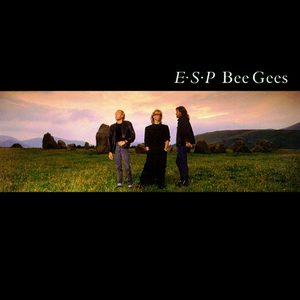 E·S·P (1987)
E·S·P (1987)
-
 Living Eyes (1981)
Living Eyes (1981)
-
 Spirits Having Flown (1979)
Spirits Having Flown (1979)
-
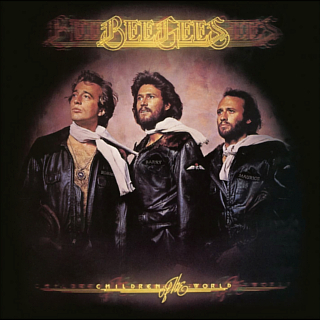 Children of the World (1976)
Children of the World (1976)
-
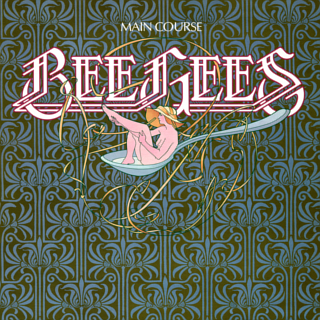 Main Course (1975)
Main Course (1975)
-
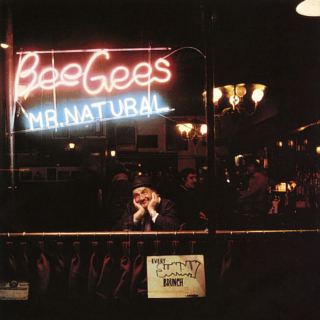 Mr. Natural (1974)
Mr. Natural (1974)
-
 Life in a Tin Can (1973)
Life in a Tin Can (1973)
-
 To Whom It May Concern (1972)
To Whom It May Concern (1972)
-
 Trafalgar (1971)
Trafalgar (1971)
-
 Cucumber Castle (1970)
Cucumber Castle (1970)
-
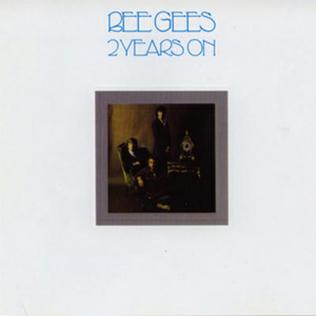 2 Years On (1970)
2 Years On (1970)
-
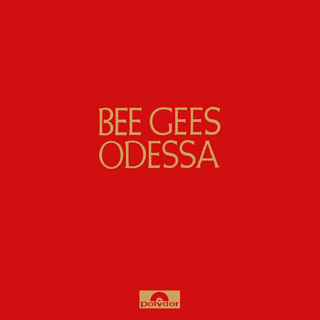 Odessa (1969)
Odessa (1969)
-
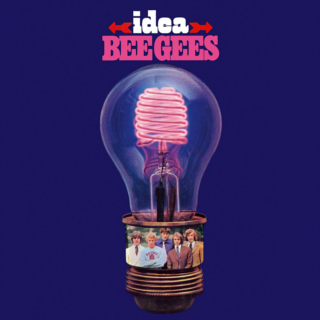 Idea (1968)
Idea (1968)
-
 Horizontal (1968)
Horizontal (1968)
-
 Bee Gees’ 1st (1967)
Bee Gees’ 1st (1967)
-
 Spicks and Specks (1966)
Spicks and Specks (1966)
-
 The Bee Gees Sing and Play 14 Barry Gibb Songs (1965)
The Bee Gees Sing and Play 14 Barry Gibb Songs (1965)
Bee Gees info & bio
The Bee Gees
were a musical group formed in 1958 by brothers Barry, Robin, and Maurice Gibb. The trio was especially successful in popular music in the late 1960s and early 1970s, and later as prominent performers in the disco music era in the mid-to-late 1970s. The group sang recognisable three-part tight harmonies: Robin's clear vibrato lead vocals were a hallmark of their earlier hits, while Barry's R&B falsetto became their signature sound during the mid-to-late 1970s and 1980s. The group wrote all their own original material, as well as writing and producing several major hits for other artists, and are regarded as one of the most important and influential acts in pop-music history. They have been referred to in the media as The Disco Kings, Britain's First Family of Harmony, and The Kings of Dance Music.
Born on the Isle of Man to English parents, the Gibb brothers lived in Chorlton, Manchester, England, until the late 1950s. There, in 1955, they formed the skiffle/rock and roll group the Rattlesnakes. The family then moved to Redcliffe, in the Moreton Bay Region, Queensland, Australia, and later to Cribb Island. After achieving their first chart successes in Australia as the Bee Gees, they returned to the UK in January 1967, when producer Robert Stigwood began promoting them to a worldwide audience. The Bee Gees' Saturday Night Fever soundtrack (1977) was the turning point of their career, with both the film and soundtrack having a cultural impact throughout the world, enhancing the disco scene's mainstream appeal. They won five Grammy Awards for Saturday Night Fever, including Album of the Year.
The Bee Gees have sold over 120 million records worldwide, placing them among the best-selling music artists of all time, as well as the most successful trio in the history of contemporary music. They were inducted into the Rock and Roll Hall of Fame in 1997; the Hall's citation stating at the time, "Only Elvis Presley, the Beatles, Michael Jackson, Garth Brooks and Paul McCartney have outsold the Bee Gees." With nine number-one hits on the Billboard Hot 100, the Bee Gees are the third-most successful band in Billboard charts history behind only the Beatles and the Supremes. Following Maurice's sudden death in 2003 aged 53, Barry and Robin retired from the group after 45 years of activity. However, in 2009 Robin announced that he and Barry had agreed the Bee Gees would re-form and perform again. Robin died in 2012, aged 62, and Colin Petersen died in 2024, aged 78, leaving Barry, Vince Melouney, and Geoff Bridgford as the surviving members of the group.
Bee Gees videos are courtesy of YouTube